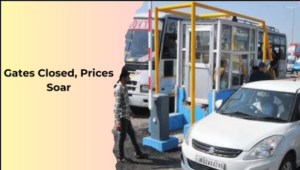Rajkotupdates.News: Nationwide Toll Plaza Shutdowns Loom

The Indian government is set to shut down all toll plazas on highways nationwide. This move aims to streamline traffic and reduce congestion.
A significant announcement has made headlines as travellers gear up for smoother rides. Rajkotupdates. News reports that toll plazas on highways across India will soon become a thing of the past. This change is part of an initiative to facilitate hassle-free transportation and minimize travel time on the country’s vast network of roads.
The decision reflects the authorities’ commitment to enhancing road travel efficiency and boosting the economy by reducing delays caused by toll collection. As the system transitions, commuters eagerly anticipate the impact of this development on their daily commutes and long-distance travel.
Impetus Behind Toll Plaza Shutdowns

India moves on the fast lane with an important decision to close toll plazas. Citizens often see toll booths as delays on the highways of progress. The shutdown could mean smoother drives and less pollution from idling cars. But what is pushing this change?
The ongoing updates on traffic flow improvement and digital transactions make toll plazas seem outdated. This bold move hopes to reduce congestion and boost economic efficiency.
Recent Policy Changes Sparking Action
- Increased digital payment adoption: More people pay digitally, a pivotal reason to reimagine toll collection.
- Federal government’s vision: Plans to shift to GPS-based systems aim to modernize road travel.
- Commitment to reducing carbon footprint: Closing toll plazas will reduce vehicle idling, helping the environment.
Organizations Spearheading The Movement
Behind this monumental push are influential groups:
- National Highways Authority of India (NHAI): The primary force, NHAI, oversees the transition to efficient traffic management.
- Ministry of Road Transport and Highways: A supporting pioneer, the ministry provides legislative backing.
- Environmental agencies advocate for changes that promise cleaner air and less pollution.
Previous Shutdowns: A Historical Context
Exploring the history of toll plaza operations paints a vivid image of how transport and commerce have previously experienced changes. Consequential events have led to the temporary cessation of toll collections, echoing economic waves across various sectors. This historical context is essential to understand the implications of the upcoming nationwide move to close toll plazas on highways.
Impact On Travel And Commerce
Toll plazas serve as both travel checkpoints and revenue generators. Shutdowns, whether for maintenance, policy changes, or other reasons, often leave travellers and businesses in a lurch. Cars, buses, and trucks face less obstruction, which could mean swifter travel, but the impact stretches beyond mere convenience.
- Increased Traffic: Short-term traffic surge as drivers capitalize on toll-free roads.
- Business Adjustments: Delivery services and transport companies may tweak logistics to optimize new patterns.
- Local Economies: Fluctuations in local trade and tourism with shifts in highway traffic.
Government Responses To Past Events
Government agencies have historically initiated closure protocols with specific strategies. Ensuring public awareness and maintaining economic balance has been at the core of such decisions. Policymakers weigh the pros and cons before disrupting the established order.
| Year | Event | Government Action |
| 2010 | System Upgrade | Scheduled notifications and alternative route suggestions |
| 2015 | Natural Disaster | Rapid toll suspension to facilitate evacuations and emergency services |
| 2019 | Policy Reform | Gradual phase-out with public consultations and feedback loops |
Economic Ramifications Of Shutdowns
The recent announcement of toll plaza shutdowns across highways has stirred a significant buzz. Understanding the economic implications of this move is crucial for grasping its overall impact.
Estimated Losses To the National Economy
Government revenue takes a hit when toll plazas shut down. Toll collections contribute to the national treasury,
helping to fund infrastructure projects. Without this income, the strain on the economy amplifies.
- Development slows as the cash flow for road maintenance and construction projects dries up.
- Public services may face budget cuts, affecting quality and availability.
Toll revenue is directly related to economic health. The loss of this crucial revenue source would significantly challenge economic stability.
Effects On The Logistics And Transport Sector
The logistics and transport sector relies on efficient highway networks for the timely delivery of goods.
| Factor | Impact |
| Freight movement | Delays may increase, raising shipping costs. |
| Fuel consumption | Longer routes to avoid closed plazas could lead to higher fuel use. |
| Transport schedules | Disrupted, causing a ripple effect on supply chains. |
| Operational efficiency | Diminishes, affecting delivery timelines and customer satisfaction. |
Small businesses in the transport sector could need help to adapt to these changes. A sudden toll plaza shutdown imposes new challenges, and adapting to them requires time and resources. Thus, the ripple effect on the economy can be profound and far-reaching.
Public Reception And Opinion
The announcement of the toll plazas closing brought varied reactions from citizens. Many took to online platforms to express their thoughts. The decision promises smoother travel, but concerns about its implementation persist.
Social Media Buzz And Sentiments
Social networks erupted with discussions as users shared the news. Posts ranging from enthusiastic support to critical analysis peppered timelines. Here’s a glimpse at the critical sentiments:
- Excitement over hassle-free commutes.
- Questions about government revenue replacement.
- Concerns regarding possible increased traffic.
Popular hashtags like #TollFreeIndia and #SmoothDrive trended, highlighting the topic’s importance.
Polls And Surveys Revealing Public Mood
Survey data offers a more structured look at public opinion. Poll results demonstrate a majority favour the initiative:
| Option | Percentage |
| Support | 72% |
| Oppose | 18% |
| Undecided | 10% |
The polls reveal a significant endorsement of the move, pointing to the public’s desire to reform highway commutes.
Legal Perspectives And Challenges
The recent announcement on the impending closure of toll plazas has stirred a vigorous debate. Legality forms the crux of this discourse. Both the protesters and the government operate within a legal framework. Each has legal justifications for their actions. Navigating these justifications poses specific challenges.
Legitimacy Of Tactics Used By Protesters
- Legal provisions for peaceful protests exist.
- Protesters cite expressive freedom.
- Disruption of traffic questions tactic legitimacy.
- Public interest is a countering legal argument.
Government’s Legal Stand On Shutdowns
The government’s stance on highway toll plaza closures follows current laws. Enforcement is critical to avoid unlawful blockades. Ensuring uninterrupted traffic flow is the state’s responsibility. The government claims to balance public convenience with fiscal implications.
Contingency Plans And Alternatives
Imagine a day with no toll booths on the highways. It’s happening soon! As the government plans to shut down all toll plazas, drivers wonder about the travel impact. But don’t worry! Thoughtful plans and alternatives are in place to ensure smooth rides for everyone. Let’s check out the intelligent moves to handle the change.
Short-term Measures For Commuters
In the short term, quick fixes will keep traffic flowing. Many are easy to follow and will help you navigate the transition effortlessly:
- Signage: Clear signs will guide you.
- Temporary Passes: Grab these to breeze through former toll spots.
- Travel Apps: Update your apps for real-time traffic updates.
These solutions will ensure you reach your destination on time without any hassle.
Long-term Strategies To Prevent Future Shutdowns
For a permanent fix, the government is rolling out long-term strategies. These moves ensure your future trips are even smoother:
- ETC Systems: Electronic toll collection is on the rise.
- Improved Infrastructure: Better roads mean fewer stoppages.
- Policy Changes: New rules will keep things moving quickly.
These steps aim to keep the traffic smooth and steady, now and in the future.
Negotiations And Resolution Efforts
Significant changes are coming for drivers across the country. The latest update shares a movement to close toll plazas on highways. Let’s dive into the efforts behind these major negotiations and how they might be resolved.
Key Stakeholders Involved In Discussions
The discussion table is full of key players. These include government officials, highway authorities, and transportation unions. Their roles are crucial for a smooth transition away from toll booths. Each stakeholder has unique concerns and objectives:
- Government Officials: Focus on public welfare and cost management.
- Highway Authorities: Ensure efficient road infrastructure maintenance.
- Transportation Unions: Look out for their members’ interests and seamless travel.
Prospects For Reaching An Agreement
The prospect of an agreement looks promising. Stakeholders aim for a win-win solution. Here’s what they hope to achieve:
| Stakeholder | Goal |
| Government | Reduce traffic and increase savings for commuters. |
| Highway Authorities | Maintain revenue for road upkeep. |
| Transportation Unions | Improve driver satisfaction and job security. |
With clear objectives, the path to consensus seems clear. The stakeholders are committed to a unified goal: better highways for all.
Impact Analysis And Future Predictions
The recent updates from Rajkotupdates.News hint at a potential change that could affect millions of commuters. The announcement about toll plazas closing on all highways raises questions about the implications. Here, we’ll analyze the impact and predict the future outcomes of this decision.
Predicting The Next Moves
The closure of toll plazas signals a shift in the country’s infrastructure funding. Immediate effects might include:
- Reduced travel time for commuters
- Lower transportation costs for logistics firms
- Changes in government revenue from tolls
Long-term predictions might involve:
- Innovation in highway maintenance financing
- Enhanced focus on digital payment systems
Sustainable Solutions To Address The Root Causes
To understand the broader picture, we must look at sustainable alternatives. Proposed solutions include:
- Fuel taxes or vehicle registration fees to fund roads
- E-tolling systems that do not require stopping
- Public-private partnerships to manage highway infrastructure
Additionally, such changes resonate with global sustainability goals. They aim to reduce emissions by minimizing idle times at toll booths.
| Comparison of Traditional vs Proposed Funding Models | |
| Traditional Model | Proposed Model |
| Toll Booths | E-tolling / Fuel Taxes |
| Stop-and-Go Traffic | Seamless Travel |
| Fossil-Fuel Dependency | Greener Alternatives |
Ultimately, the transition from traditional toll booths offers exciting possibilities. It sets the stage for innovative funding models and greener transportation networks. With the proper execution, the ripple effect could catalyze positive changes across economic and environmental spectrums.
Conclusion
The shutdown of toll plazas will unleash Indian highway travel. This decision reflects the government’s drive for efficiency and traveller convenience. Stay tuned to Rajkot updates. News for more updates as we track the impact of this nationwide change on your journeys.



